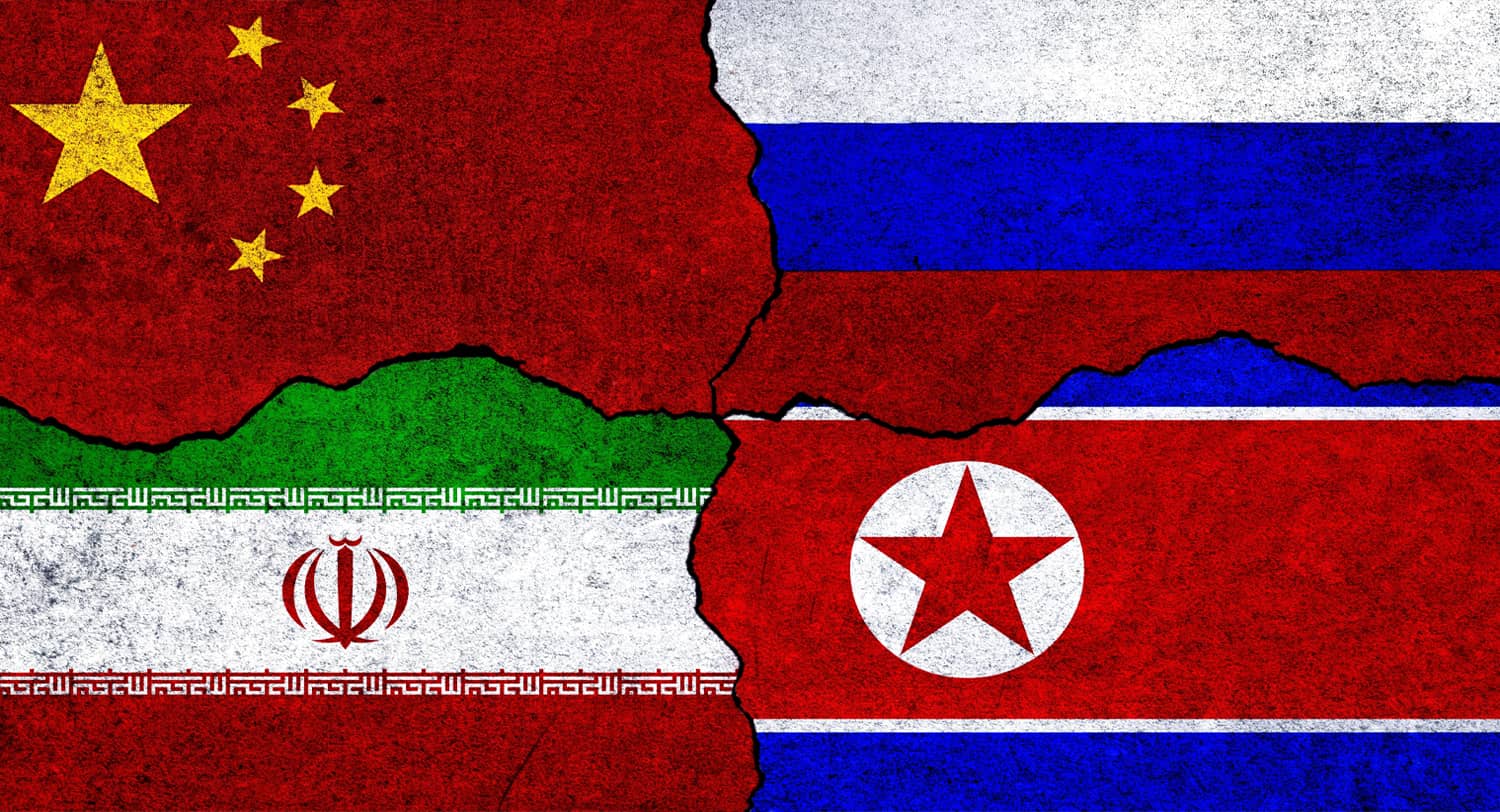Military aggressions and provocations by China, Russia, Iran, and North Korea have created one of the most dangerous security environments in decades. Making matters worse, these powers are supporting each other in their malign actions. How should we refer to this emerging bloc?
Russia is waging war to make Ukraine its colony again. Iran has attacked Israel both directly and through its terrorist proxies Hamas, Hizbullah, and the Houthis. China wants to occupy independent Taiwan by force and is keeping up constant military pressure on the island. North Korea wants to coerce South Korea into agreeing to unification under Pyongyang’s control. In each case, the aggressor is a brutal dictatorship with a less successful economy and a less free society than the target of its attacks.
The aggressors support each other. Russia receives from Iran and North Korea military supplies, and from China machine tools and semiconductors that it uses in its military industry. In return, Russia is supplying advanced military technology and equipment. Ninety percent of Iranian oil exports go to China. North Korea is rumored to have sent a military contingent to fight alongside Russia in Ukraine. China, Russia, and Iran have held military exercises together. All these countries also help each other diplomatically in international fora.
The emergence of a bloc of nuclear or near-nuclear countries that openly support each other in changing international borders by force is a very dangerous development. It brings to mind the 1930s when the Axis Powers of Germany, Italy, and Japan caused conflicts in different parts of the world that later converged into one global conflagration.
What should we call this group of countries that, though not formal treaty allies, act in an increasingly coordinated manner?
Former National Security Advisor Robert O’Brien refers to a “new Beijing-Moscow-Tehran axis” and the need for determined action to “thwart and deter” it. Some talk of a China-Russia axis of revisionists. There are mentions of an alliance of autocracies, a quartet of chaos, an axis of aggressors, and a new axis of evil.
Each of these terms sheds light on a defining characteristic of this bloc. “Axis” is helpful in creating an association with the dictatorial powers that plunged the world into the Second World War. Calling them “autocracies” is factual – none of these countries is a democracy. “Aggression” describes their actions and “revisionism” their mindset. “Chaos” is an apt adjective for their effect on international relations. “Evil” becomes a good summary of these regimes’ brutal actions at home and unprovoked aggression abroad.
“Axis of expansionists” summarizes the insights above and adds additional helpful perspectives. It allows us to set aside the terms “revisionist” and “autocratic” without losing their insights: The problem with these powers is not that they espouse revisionist theories, but that they act on them by attacking other countries.
Similarly, many autocratic regimes are not a threat to world peace and may actually contribute to maintaining it. “Chaos” and “evil” are accurate but do not tell us exactly how they are causing the chaos or why the evil of these regimes is a threat to other countries.
“Aggression” conveys to us that they are acting on their evil intentions. It is also broad enough to refer to more than just military aggression. For example, China is responsible for many kinds of economic malign acts that could be viewed as economic aggression. And all of them are engaged in gray zone activities to hurt America and other free world countries.
“Expansionist” subsumes all the above insights and adds one more: The aggressions of these powers aim to permanently change borders and alter international relations to their advantage.
The Axis of Expansionists of China, Russia, Iran, and North Korea are a grave threat to the peace, freedom, and prosperity of America and the free world. The growing collaboration between them magnifies, diversifies, and expands the reach of the danger that each of them represents by itself. The freedom-loving countries of the world need to recognize that countering this axis will require concerted and sustained action by them over many decades.

